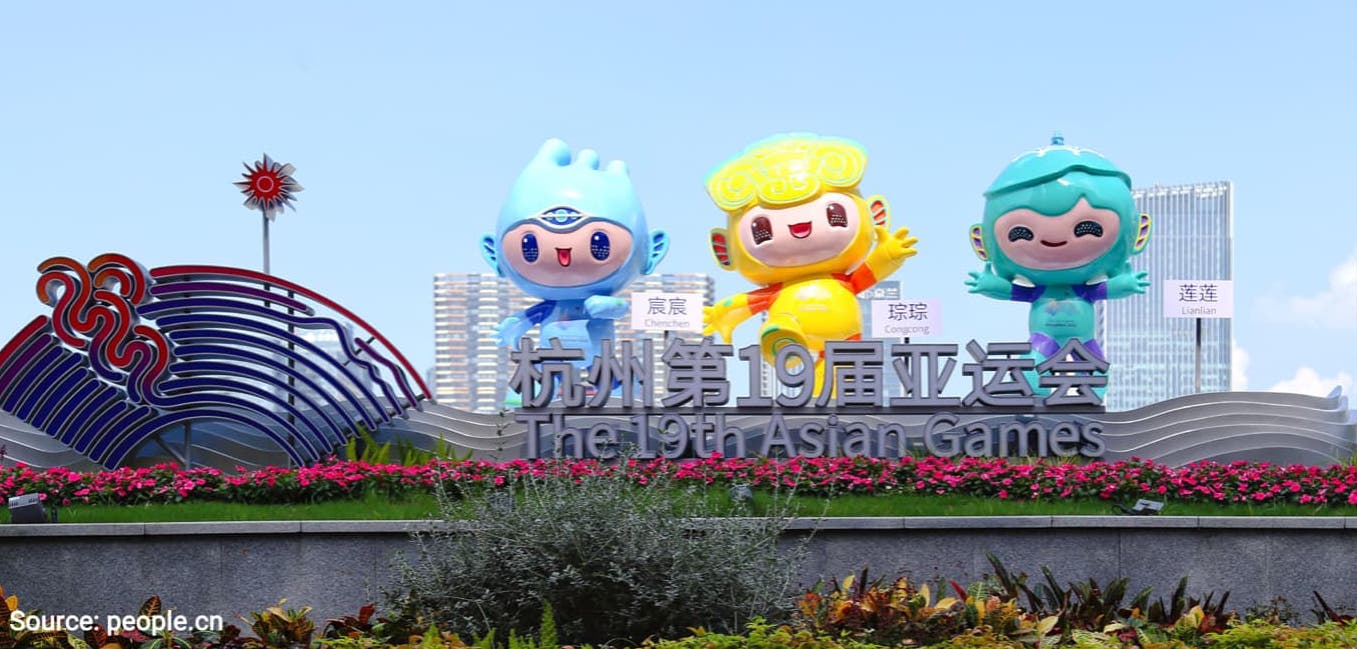The 19th Asian Games, held in Hangzhou, China, is not just a sports event; it is a symbol of resilience and unity. Delayed by one year due to the pandemic, this grand sporting spectacle finally started on September 23rd, 2023, and lasted until October 8th. With 45 countries participating and about 12,000 athletes competing across 40 sports in 56 venues and 6 cities, this event has truly marked its place in history. The Games were opened by China’s leader Xi Jinping during a ceremony that left spectators in awe.
Download the full report on the She economy in China!

A catalyst for development, diplomacy, and global connectivity
The significance of the Asian Games extended beyond sports. It played a pivotal role in promoting the development of Hangzhou and its neighboring cities, Huzhou, Ningbo, Shaoxing, Jinhua, and Wenzhou. As the biggest event held in China after the pandemic, the Asian Games signals that the country has bounced back from the crisis and is still a strong economic power. Moreover, the event helps strengthen diplomatic relationships among participating nations, fostering goodwill and cooperation. Foreign dignitaries from Syria, South Korea, and Malaysia attended the opening ceremony in Hangzhou along with Xi Jinping. This emphasis on global cooperation is also illustrated by the slogan of the event ‘Heart to Heart, @Future’, which reflects the games as a platform to connect people from around the world.

Hangzhou’s preparations for the Games
The Asian Games spurred massive investments in Hangzhou’s infrastructure, including stadiums, airports, and mass transit projects. While the budget for the games was not disclosed, Reuters estimates that Hangzhou’s government spent over RMB 200 billion on infrastructure development. This investment resulted in an impressive boost to Hangzhou’s GDP, with an increase of RMB 414.1 billion. The city also adorned itself with lush greenery, giving its citizens plant seeds to enhance Hangzhou’s aesthetic appeal. Themed subways and a high-speed rail line connecting Hangzhou and Huzhou were constructed to facilitate transportation.
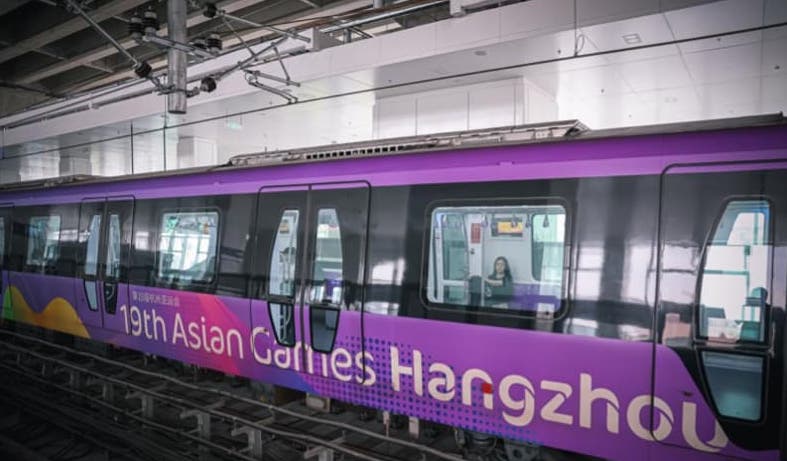
Marketing the city’s rich heritage
Hangzhou went all out in its marketing efforts, with colorful mascots adorning banners and lamp posts. These mascots not only symbolize the Games but also represent Hangzhou’s rich culture, history, innovation, and beauty. The first mascot, Congcong, is yellow and represents the archaeological ruins of Liangzhu City, a famous spot in Hangzhou. The second one, Chengchen, is blue and represents the Beijing-Hangzhou Grand Canal. The last one, Lianlian, is green and symbolizes the West Lake (西湖), the city’s most famous tourist location.
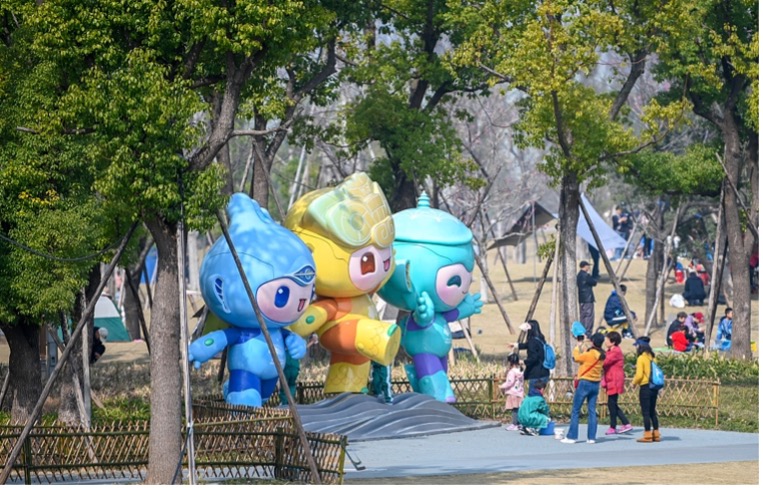
Tech innovation and sustainability take center stage
Hangzhou showcased its strengths in technology and sustainability. It introduced glasses-free 3D and augmented reality experiences for spectators. Incorporating digital fireworks introduced a modern twist to traditional celebrations while also breaking from the convention of using real fireworks during opening ceremonies due to sustainability concerns. Moreover, robots were employed for guidance and security at the event. Hangzhou, which is home to the technology giant Alibaba, prides itself as an innovative city and aims to showcase its cutting-edge technology to visitors.
Chinese sporting goods benefit from the Games
The boost of domestic brands
The Asian Games revitalized the Chinese sports industry, providing a boost to major Chinese sports brands. The local sportswear brands Li-Ning and Anta benefited from the event, further solidifying their position in the market. Their stock prices on the Hong Kong stock market rose by 5% and 4% respectively on September 29th. Analysts attribute that increase to the Hangzhou Asian Games, and they expect to see further increases as the Games continue. Anta has played a pivotal role in designing apparel for the Chinese weightlifting, gymnastics, and boxing teams, incorporating the exquisite Hangzhou embroidery technique. This initiative underscores Anta’s aspiration to establish itself as a prominent national brand, aligning seamlessly with the Guochao trend that resonates with young Chinese consumers.
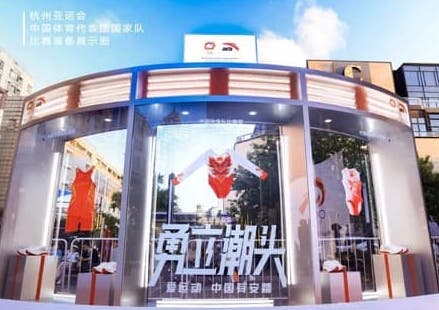
On Weibo, reads for Anta’s hashtag #lovesportsChinahasAnta# (爱运动中国有安踏) have increased fivefold from the 23rd to the 24th of September, indicating a sharp rise in interest for the brand.
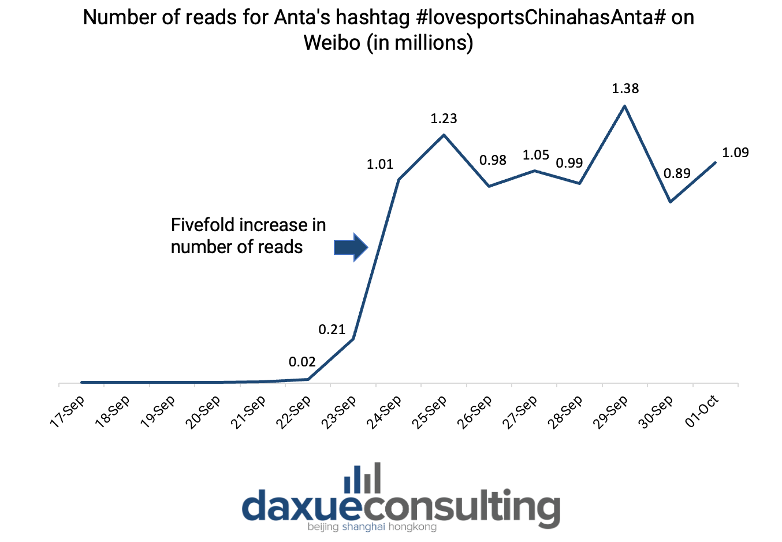
Sporting goods exports from China soared
China’s sporting goods industry witnessed a surge in exports, especially to Asian countries. Yiwu (义乌), a hub for sporting goods, exported RMB 4.21 billion of sporting products in the first seven months of 2023, representing a 24.6% year-on-year increase. Exports of sporting goods to Asian countries increased by 12.7% year-on-year to 1.42 billion yuan. The Games played a significant role in this growth, with ball game-related products experiencing a remarkable 30% year-on-year sales increase. Sporting goods manufacturers have felt the increase in demand as the Asian Games approached, but they have not always been able to meet the demand. A sports equipment store owner in Yiwu mentioned that overseas orders are smaller but for higher-quality products. This pushes sporting goods manufacturers to invest in R&D to produce high-margin products. China mainly exports sporting goods to the United States, India and Vietnam, and faster growth in demand is witnessed from Southeast Asian countries.
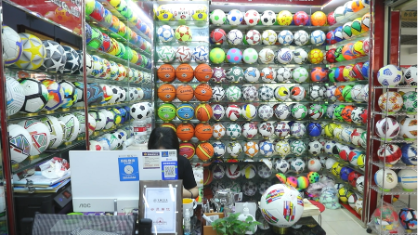
The Asian games’ pull on the economy
The Games’ impact on hospitality and tourism
The Asian Games has had a profound impact on the travel and hospitality industry in Hangzhou, with an expected 20 million visitors during that period. This effect is even more important since the games coincide with the Mid-Autumn Festival and National Day. Chinese people have a week of vacation from September 29th to October 6th, known as the “Golden Week”, and Hangzhou has ranked among the top three in terms of popular destination for this period.
Qunar (去哪儿), the Chinese online travel agency platform, revealed that as of September 17th, domestic bookings for hotels are 514% higher than in 2019 at the same period. As for plane travel, an estimated 21 million passengers will be taking the plane, which is 17% more than in October 2019. Hotels, plane and train tickets to Hangzhou and surrounding cities are short in supply, signalling people’s enthusiasm for the event.
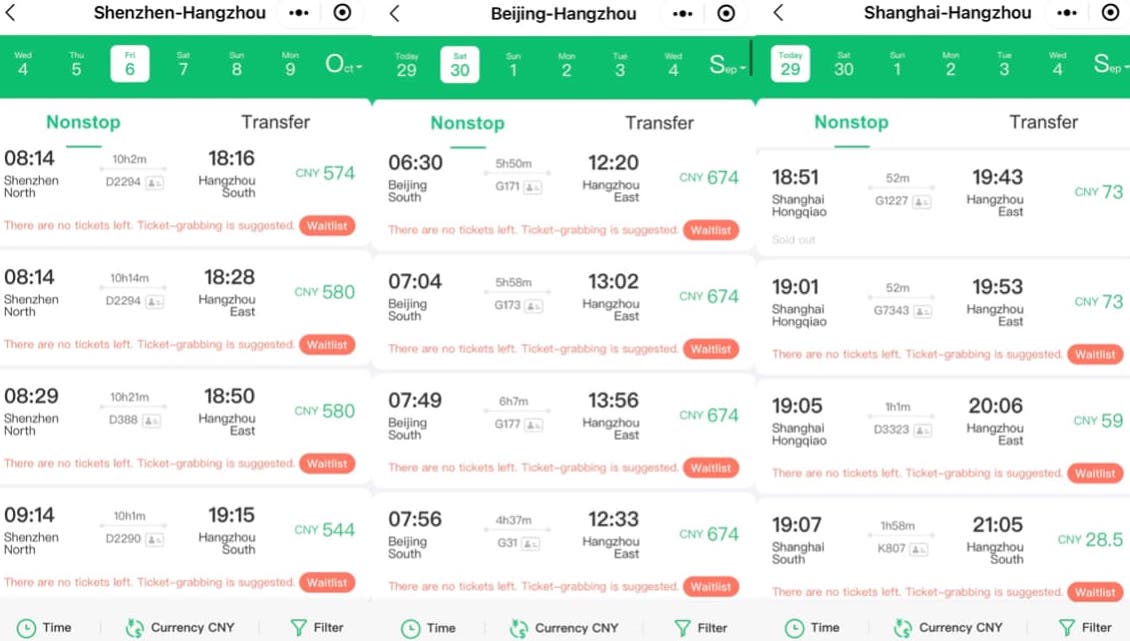
Tourists mainly come from major Chinese cities such as Shanghai, Shenzhen, Chengdu, and Guangzhou, as well as from neighboring countries like Thailand, Singapore, South Korea, Japan, and Malaysia. Hangzhou’s airport introduced several international routes to accommodate the influx of visitors, from Jeju, Chiang Mai, Manila, and Bali, to name a few.
The Games’ impact on the retail industry
The retail sector experienced a boom, thanks to the Asian Games. Game-themed souvenirs, including t-shirts and memorabilia, have flown off the shelves, and people line up in front of the shops before they open. The licensed products include little mascot toys, medals, umbrellas, cups, towels, coins, and bags.
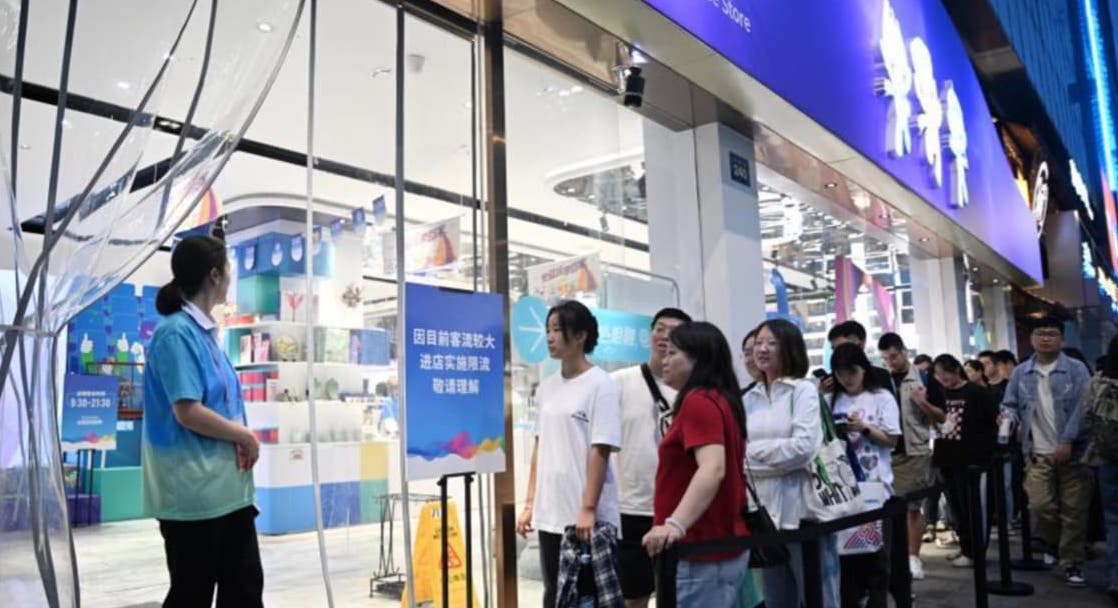
Hangzhou’s specialities, such as Longjing tea (龙井茶), also saw increased demand. Customers are either visitors who wish to take souvenir home, or Hangzhou locals visiting relatives in other regions.
Small and micro-enterprises contribute to the success of the Games
The 19th Asian Games also had a significant impact on small and micro-enterprises, which catered to various aspects of the event. It is estimated that more than 60% of the suppliers for the Games are small merchants, and about a quarter of them started preparing a year to two years in advance. These small enterprises include boat manufacturers for the dragon boat competitions, badge manufacturers, and ball manufacturers, coming from Yiwu, Hangzhou, Wenzhou, and many other cities across China. In that regard, the Asian Games create a spillover effect by increasing the profitability of private enterprises.
The gig economy is at full speed
In Hangzhou, the Games and the Golden Week have brought in a large number of tourists, leading to new opportunities for service providers like Didi (滴滴出行). Didi has taken significant measures to prepare for the Games, including comprehensive training programs for drivers to ensure the safety and satisfaction of visitors. Since September 18th, the usage of online ride-hailing services in Hangzhou has surged by 40% compared to the previous week, and this demand is anticipated to peak during the first week of October.
Another ride-hailing company, Caocao (曹操出行), has recruited more than 2,000 drivers specifically to cater to Games-related guests, including delegations, officials, media personnel, staff, and VIPs arriving at the airport. These drivers have undergone rigorous training covering various aspects such as knowledge about the Games, safe driving practices, emergency response, and service etiquette. These selected drivers take their responsibilities seriously, recognizing that they serve as representatives of Hangzhou to the world.
Moreover, tourists who prefer driving themselves have significantly contributed to the increase in car rentals, which have seen a 30% rise compared to the period before the Golden Week.
What we can learn from the 19th Asian Games:
- Beyond sports, the 19th Asian Games have played a vital role in the economic resurgence of Hangzhou and its neighboring cities. The massive investments in infrastructure and development indicate that China remains a strong economic power even after the pandemic. This event also serves as a platform for fostering goodwill and cooperation among participating nations.
- Chinese sportswear brands like Anta and Lining have thrived due to their association with the Games. This boost not only solidifies their market position but also contributes significantly to the country’s economy. The surge in sporting goods exports, particularly to Asian countries, indicates the global appeal of Chinese sports products.
- Besides the sports industry, Hangzhou’s hospitality and tourism sectors have experienced a substantial surge in visitors during the Games, coinciding with China’s “Golden Week.” Moreover, this positive impact has also touched China’s retail sector, small and micro-enterprises, and the gig economy.


